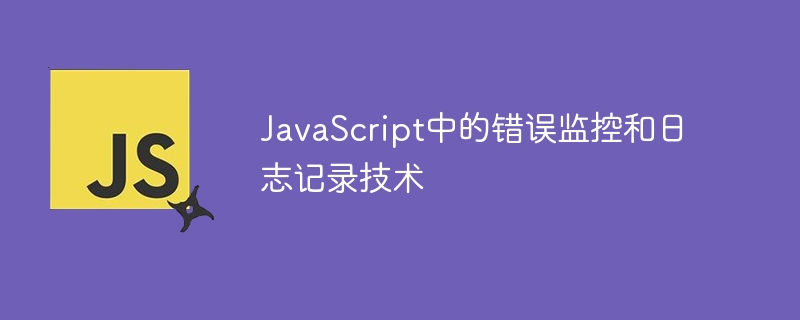JavaScript中的错误监控和日志记录技术

JavaScript 错误监控和日志记录对于维护应用程序的稳定性和性能至关重要。在本文中,我们将探索可以帮助您有效监控和记录 JavaScript 代码中的错误的先进技术。我们将介绍全局错误处理程序、try/catch 块、堆栈跟踪、日志库、自定义错误类、错误报告和通知以及生产中的错误跟踪。
全局错误处理程序
全局错误处理程序允许您捕获并处理 JavaScript 应用程序运行时发生的错误。通过利用 window.onerror 和 window.onunhandledrejection,您可以记录或报告错误和异常。
示例
window.onerror = function(message, url, line, column, error) {
console.error("An error occurred:", message);
console.error("URL:", url);
console.error("Line:", line);
console.error("Column:", column);
console.error("Error object:", error);
};
window.onunhandledrejection = function(event) {
console.error("Unhandled promise rejection:", event.reason);
};
说明
所提供的代码在 JavaScript 中设置全局错误处理程序。 window.onerror 捕获未处理的错误并记录错误消息、脚本 URL、行号和列号以及错误对象。 window.onunhandledrejection 捕获未处理的 Promise 拒绝并记录拒绝原因。这些处理程序有助于识别和记录网页运行时发生的错误。
输出
An error occurred: ReferenceError: someVariable is not defined URL: https://example.com/js/app.js Line: 42 Column: 15 Error object: ReferenceError: someVariable is not defined
尝试/捕获块
Using try/catch blocks allows you to handle specific exceptions and gracefully recover from errors that might occur within a block of code.
示例
try {
// Code that might throw an error
const result = someFunction();
console.log("Result:", result);
} catch (error) {
console.error("An error occurred:", error);
}
说明
提供的代码使用 try/catch 块来处理 JavaScript 中的潜在错误。 try 块包含可能引发错误的代码,如果发生错误,则执行 catch 块,它使用 console.error() 记录错误消息。
输出
An error occurred: TypeError: someFunction is not a function
堆栈跟踪
堆栈跟踪提供了有关导致错误的函数调用顺序的宝贵信息。它们有助于了解错误的根源并有效地诊断问题。
示例
function foo() {
bar();
}
function bar() {
throw new Error("Something went wrong");
}
try {
foo();
} catch (error) {
console.error("Error stack trace:", error.stack);
}
说明
代码定义了两个函数:foo() 和 bar()。当 foo() 被调用时,它会调用 bar(),它会使用 throw new Error() 故意抛出一个错误。
代码包含在 try/catch 块中。当 try 块内抛出错误时,catch 块会捕获该错误,并将错误对象存储在 error 变量中。
catch 块使用 console.error() 和 error.stack 属性记录错误的堆栈跟踪。
输出
Error stack trace: Error: Something went wrong at bar (script.js:5:9) at foo (script.js:2:3) at script.js:10:3
记录库
像 Sentry、Rollbar 和 LogRocket 这样的日志库提供了高级错误监控功能。它们简化了错误跟踪、聚合和报告,并且通常提供与框架和服务的集成。
示例
// Using Sentry logging library
Sentry.init({
dsn: 'your-sentry-dsn',
// Other configuration options
});
try {
// Code that might throw an error
} catch (error) {
Sentry.captureException(error);
}
说明
代码初始化 Sentry 日志库并设置错误捕获。在try块内,可以放置可能抛出错误的代码,如果发生错误,catch块使用Sentry.captureException()将错误发送给Sentry进行记录和分析。
自定义错误类
Extending the built-in Error class allows you to create custom error classes with additional properties and methods. This makes error handling more informative and easier.
示例
Consider the code shown below.
class MyCustomError extends Error {
constructor(message, customProperty) {
super(message);
this.customProperty = customProperty;
}
}
try {
throw new MyCustomError("Something went wrong.", "Custom data");
} catch (error) {
console.error("Custom property:", error.customProperty);
}
说明
该代码定义了一个扩展 Error 的自定义错误类 MyCustomError。在 try 块内,它抛出一个带有特定错误消息和自定义属性的 MyCustomError 实例。在 catch 块中,它记录捕获的错误对象的自定义属性。
输出
Custom property: Custom data
错误报告和通知
Integrate your error monitoring system with notification services like email or chat platforms to receive real-time alerts when critical errors occur.
示例
Consider the code shown below.
function sendErrorNotification(error) {
// Code to send an error notification via email or chat
}
try {
// Code that might throw an error
} catch (error) {
sendErrorNotification(error);
}
说明
该代码定义了一个函数 sendErrorNotification(),它接受一个错误参数并包含发送错误通知的逻辑,例如通过电子邮件或聊天。
在 try 块中,您可以放置可能引发错误的代码。如果发生错误,则执行 catch 块,并以错误对象作为参数调用 sendErrorNotification() 函数,触发错误通知流程。
此代码演示了如何在 try 块内发生错误时通过调用自定义函数发送错误通知来处理错误。它允许主动通知和响应错误,有助于及时排除故障并解决问题。
结论
有效的错误监控和日志记录技术对于维护 JavaScript 应用程序的稳定性和性能至关重要。通过利用全局错误处理程序、try/catch 块、堆栈跟踪、日志记录库、自定义错误类、错误报告和通知以及生产中的错误跟踪,您可以更有效地检测、诊断和解决问题。请记住在日志记录细节和数据敏感性之间取得平衡,并定期检查日志以主动维护和改进应用程序。
以上是JavaScript中的错误监控和日志记录技术的详细内容。更多信息请关注PHP中文网其他相关文章!

热AI工具

Undresser.AI Undress
人工智能驱动的应用程序,用于创建逼真的裸体照片

AI Clothes Remover
用于从照片中去除衣服的在线人工智能工具。

Undress AI Tool
免费脱衣服图片

Clothoff.io
AI脱衣机

Video Face Swap
使用我们完全免费的人工智能换脸工具轻松在任何视频中换脸!

热门文章

热工具

记事本++7.3.1
好用且免费的代码编辑器

SublimeText3汉化版
中文版,非常好用

禅工作室 13.0.1
功能强大的PHP集成开发环境

Dreamweaver CS6
视觉化网页开发工具

SublimeText3 Mac版
神级代码编辑软件(SublimeText3)
 Python vs. JavaScript:学习曲线和易用性
Apr 16, 2025 am 12:12 AM
Python vs. JavaScript:学习曲线和易用性
Apr 16, 2025 am 12:12 AM
Python更适合初学者,学习曲线平缓,语法简洁;JavaScript适合前端开发,学习曲线较陡,语法灵活。1.Python语法直观,适用于数据科学和后端开发。2.JavaScript灵活,广泛用于前端和服务器端编程。
 JavaScript和Web:核心功能和用例
Apr 18, 2025 am 12:19 AM
JavaScript和Web:核心功能和用例
Apr 18, 2025 am 12:19 AM
JavaScript在Web开发中的主要用途包括客户端交互、表单验证和异步通信。1)通过DOM操作实现动态内容更新和用户交互;2)在用户提交数据前进行客户端验证,提高用户体验;3)通过AJAX技术实现与服务器的无刷新通信。
 JavaScript在行动中:现实世界中的示例和项目
Apr 19, 2025 am 12:13 AM
JavaScript在行动中:现实世界中的示例和项目
Apr 19, 2025 am 12:13 AM
JavaScript在现实世界中的应用包括前端和后端开发。1)通过构建TODO列表应用展示前端应用,涉及DOM操作和事件处理。2)通过Node.js和Express构建RESTfulAPI展示后端应用。
 了解JavaScript引擎:实施详细信息
Apr 17, 2025 am 12:05 AM
了解JavaScript引擎:实施详细信息
Apr 17, 2025 am 12:05 AM
理解JavaScript引擎内部工作原理对开发者重要,因为它能帮助编写更高效的代码并理解性能瓶颈和优化策略。1)引擎的工作流程包括解析、编译和执行三个阶段;2)执行过程中,引擎会进行动态优化,如内联缓存和隐藏类;3)最佳实践包括避免全局变量、优化循环、使用const和let,以及避免过度使用闭包。
 Python vs. JavaScript:社区,图书馆和资源
Apr 15, 2025 am 12:16 AM
Python vs. JavaScript:社区,图书馆和资源
Apr 15, 2025 am 12:16 AM
Python和JavaScript在社区、库和资源方面的对比各有优劣。1)Python社区友好,适合初学者,但前端开发资源不如JavaScript丰富。2)Python在数据科学和机器学习库方面强大,JavaScript则在前端开发库和框架上更胜一筹。3)两者的学习资源都丰富,但Python适合从官方文档开始,JavaScript则以MDNWebDocs为佳。选择应基于项目需求和个人兴趣。
 Python vs. JavaScript:开发环境和工具
Apr 26, 2025 am 12:09 AM
Python vs. JavaScript:开发环境和工具
Apr 26, 2025 am 12:09 AM
Python和JavaScript在开发环境上的选择都很重要。1)Python的开发环境包括PyCharm、JupyterNotebook和Anaconda,适合数据科学和快速原型开发。2)JavaScript的开发环境包括Node.js、VSCode和Webpack,适用于前端和后端开发。根据项目需求选择合适的工具可以提高开发效率和项目成功率。
 C/C在JavaScript口译员和编译器中的作用
Apr 20, 2025 am 12:01 AM
C/C在JavaScript口译员和编译器中的作用
Apr 20, 2025 am 12:01 AM
C和C 在JavaScript引擎中扮演了至关重要的角色,主要用于实现解释器和JIT编译器。 1)C 用于解析JavaScript源码并生成抽象语法树。 2)C 负责生成和执行字节码。 3)C 实现JIT编译器,在运行时优化和编译热点代码,显着提高JavaScript的执行效率。
 Python vs. JavaScript:比较用例和应用程序
Apr 21, 2025 am 12:01 AM
Python vs. JavaScript:比较用例和应用程序
Apr 21, 2025 am 12:01 AM
Python更适合数据科学和自动化,JavaScript更适合前端和全栈开发。1.Python在数据科学和机器学习中表现出色,使用NumPy、Pandas等库进行数据处理和建模。2.Python在自动化和脚本编写方面简洁高效。3.JavaScript在前端开发中不可或缺,用于构建动态网页和单页面应用。4.JavaScript通过Node.js在后端开发中发挥作用,支持全栈开发。






